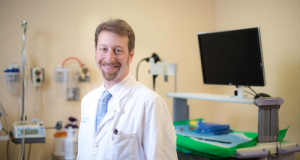Results from the phase-2 trial co-led by Evan S. Dellon, MD, MPH, in the division of gastroenterology and hepatology, were published in the New England Journal of Medicine.

Eosinophilic gastritis and duodenitis are inflammatory diseases characterized by high levels of eosinophils and mast cells (immune system cells) in the stomach and duodenum. These disorders are often underdiagnosed and symptoms include chronic abdominal pain and cramping, nausea, bloating, loss of appetite, vomiting and diarrhea. The current standard of care includes corticosteroids, dietary elimination, or both. However, none are optimally effective for an estimated 50,000 people who suffer from these conditions.
A phase-2 trial co-led by Evan S. Dellon, MD, MPH, professor in the School of Medicine’s division of gastroenterology and hepatology and adjunct professor epidemiology in the UNC Gillings School of Global Public Health, showed that a novel humanized monoclonal antibody known as AK002 (lirentelimab) can target the siglec-8 receptor, which is highly specific to eosinophils and mast cells, and subsequently deplete eosinophils and inhibit mast cells. The study was published this week in the New England Journal of Medicine.
“This study is important for several reasons,” said Dellon. “It’s the first randomized trial in eosinophilic gastritis/duodenitis, which are understudied conditions for which there is a pressing need for new patient treatments. Second, the medication has a novel mechanism of action via the siglec-8 receptor, and this study now shows proof of concept in eosinophilic gastrointestinal diseases (EGID) of the utility of targeting this pathway. Finally, the results demonstrate efficacy. Patients not only had prominent decreases in their tissue eosinophil counts, but also had a substantial symptom improvement compared to placebo. Given the promising results, the medication has moved on to a phase-3 study in EG/EoD and a phase 2/3 study in eosinophilic esophagitis (EoE).”
The phase-2 trial randomly assigned adults who had symptomatic eosinophilic gastritis, eosinophilic duodenitis, or both conditions in a 1:1:1 ratio to receive four monthly infusions of low-dose AK002, high-dose AK002, or placebo. Of the 65 patients who underwent randomization, 43 were assigned to receive AK002 and 22 were assigned to receive placebo.
AK002 was more effective than placebo with respect to all the pre-specified primary and secondary end points. Patients who received low-dose or high-dose AK002 had significant reductions in tissue eosinophil counts, accompanied by substantial reductions in symptoms, whether assessed in the predefined per-protocol analysis or in an intention-to-treat analysis. AK002 treatment reduced gastrointestinal eosinophil burden and led to reductions in symptoms in adult patients with eosinophilic gastritis, eosinophilic duodenitis, or both conditions, as compared with placebo.
Other study sites included the University of Utah, Salt Lake City; Mayo Clinic Rochester, Rochester, MN; the University of Pennsylvania Perelman School of Medicine, Philadelphia; Northwestern University, Chicago; the Icahn School of Medicine at Mount Sinai, New York; Baylor College of Medicine, Houston; Tufts University, Boston; the National Institute of Allergy and Infectious Diseases, National Institutes of Health, Bethesda, MD; Ventura Clinical Trials, Ventura, and Allakos, Redwood City, both in California; Vanderbilt University, Nashville, TN; the Division of Allergy and Immunology, Cincinnati Children’s Hospital, University of Cincinnati College of Medicine, Cincinnati; and Pharma Data Associates, Piscataway, NJ.
Funding for the study was provided by Allakos, the Division of Intramural Research, National Institute of Allergy and Infectious Diseases, National Institutes of Health and the National Center for Advancing Translational Sciences.